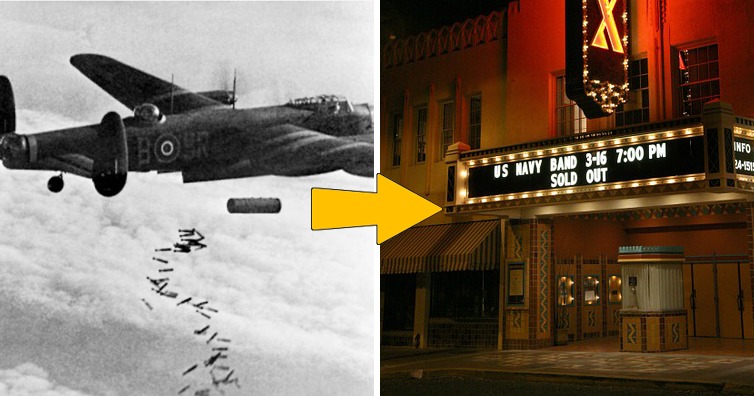The term blockbuster is used in the entertainment business when we refer to a highly successful movie. Since its first appearance in the promotion of movies published in 1943, the term blockbuster is now synonymous with large audience response. But what’s the exact origin of this everyday term? Why success means… busting blocks?
Here’s the interesting story.
As it turns out, there was a time when success actually meant breaking blocks, or more specifically bombing blocks, and it all has to do with World War II: (the article continues after the ad)
THE ‘BLOCKBUSTER’ BOMB
In 1943, the Allied forces started using a rather heavy bomb (typically between 4,000 and 8,000 pounds – 1,800 and 3,600 Kg) in their bombings of military targets in Nazi-occupied Europe. These bombs were so powerful, the press gave them the nickname ‘blockbuster’ as a reference to their huge-scale destruction that could destroy an entire city block!
THE ‘CITY BUSTER’ BOMB
Blockbusters were the largest aerial bombs at the time, until British Royal Air Force (RAF) introduce a 12,000 pound (5,400 Kg) bomb in February 1944. In fact, this new bomb was given the nickname ‘factory buster’ since just one of them, could easily destroy a large Nazi military factory. Just one year later, when the first atomic bombs were dropped in Hiroshima and Nagasaki, the Chicago Sun-Times cleverly (and for obvious reasons) gave them the name ‘city busters’.
FROM WARFARE TO… ENTERTAINMENT
The first use of the term ‘blockbuster’ in the entertainment business dates back to 1943 and it was used for a war film named ‘Bombardier’. The tagline of the movie reads: “The block-buster of all action-thrill-service shows!”. The movie’s title cleverly uses the blockbuster bomb on its dramatic content which was the bombing of Tokyo, Japan. A year later, in 1944, another war movie called ‘Marines at Tarawa’ was marketed with the slogan: ‘It hits the heart like a two ton blockbuster!’.
Because both of these movies were successful, publicists started associating the term ‘blockbuster’ with massive impact. Reporters, reviewers and copy-writers started using the word in their journals and soon enough ‘blockbuster’ became a marketing tool indicating that a film was going to be a huge success. The nickname stuck and that’s why we, even today, refer to commercially hit movies as ‘blockbusters’.
If you like what you read, then you will definitely love this one: Why Is It Called ‘Caesar Salad’?
Main Article Photo: Wikimedia, MaxPixel
Photoshop: I’m A Useless Info Junkie
Sources: Pass the ammunition : a short etymology of “Blockbuster” | Why Is It Called a Blockbuster?



